The fusion of technology and urban planning has given birth to the concept of Smart Cities. These modern metropolises utilize advanced digital infrastructure to enhance the quality of life for their citizens. One of the key areas where this transformation is most evident is in transportation. Smart Cities are redefining urban mobility, making it more efficient, eco-friendly, and convenient. In this blog post, we will explore the various facets of this revolution, from intelligent traffic management to sustainable public transportation solutions.
Intelligent Traffic Management Systems
Smart Cities leverage cutting-edge technologies to optimize traffic flow and reduce congestion. Advanced traffic management systems, equipped with real-time data analysis and machine learning algorithms, enable cities to monitor traffic patterns, predict congestion, and implement adaptive traffic signals. By synchronizing traffic lights based on real-time demand, cities can significantly reduce waiting times at intersections, easing traffic congestion and minimizing fuel consumption. This not only saves time for commuters but also contributes to the overall reduction of carbon emissions, fostering a greener environment.
Sustainable Public Transportation
Efficient public transportation is the backbone of any Smart City. These cities invest in eco-friendly modes of transport, such as electric buses and trains, to minimize their carbon footprint. Additionally, they employ smart ticketing systems that allow commuters to pay using digital wallets or contactless cards, streamlining the boarding process and reducing the time spent at ticket counters. Moreover, Smart Cities integrate various modes of transportation, including buses, trains, trams, and bicycles, into a unified network accessible through a single application. This multimodal approach provides citizens with diverse transportation options, promoting the use of public transport and reducing the dependency on private vehicles.
Smart Parking Solutions
Smart parking solutions in Smart Cities represent a pivotal advancement in urban mobility and convenience. These innovative systems utilize cutting-edge technology, including Internet of Things (IoT) sensors and real-time data analysis, to revolutionize the parking experience. Embedded sensors in parking spaces detect the presence of vehicles and relay this information to a central control system. This data is then made accessible to drivers through mobile applications or digital signage, enabling them to quickly locate available parking spots, thereby reducing the frustrating and time-consuming hunt for parking.
Moreover, Smart Cities often incentivize the use of these smart parking systems by offering discounts or special rates to commuters who choose to park their vehicles in designated areas and then utilize public transportation for the remainder of their journey. This approach not only alleviates traffic congestion and reduces carbon emissions but also enhances the overall quality of life for urban residents by reducing stress associated with parking, making parking a hassle-free and efficient experience.
Furthermore, as part of their sustainability initiatives, Smart Cities are increasingly incorporating eco-friendly elements in their parking solutions, including electric vehicle charging stations, further promoting the adoption of electric vehicles and reducing the carbon footprint associated with urban commuting. In essence, smart parking solutions in Smart Cities epitomize the convergence of technology and urban planning, making cities more livable, efficient, and environmentally responsible.
Data-Driven Decision Making
Data lies at the heart of Smart Cities. Advanced analytics tools process vast amounts of data generated by various sources, including traffic cameras, sensors, and smartphones. By analyzing this data, city officials gain valuable insights into traffic patterns, peak commuting hours, and popular routes. This information empowers them to make data-driven decisions, such as optimizing bus routes, deploying additional public transport during peak hours, and implementing road expansions where necessary. Data-driven decision making not only enhances the efficiency of transportation systems but also ensures that resources are utilized judiciously, making urban mobility more sustainable in the long run.
Citizen Engagement and Education
Smart Cities actively engage with their citizens to create awareness about sustainable transportation practices. Public awareness campaigns, workshops, and seminars are organized to educate citizens about the benefits of using public transport, carpooling, and cycling. Additionally, cities develop user-friendly applications that provide real-time updates on public transport schedules, delays, and route changes. By keeping citizens informed and involved, Smart Cities encourage active participation in building a greener, more efficient transportation ecosystem.
Smart Cities and A Sustainable Future
In conclusion, the integration of technology in urban transportation is reshaping the way people move within cities. Smart Cities are not just about gadgets and connectivity; they are about creating sustainable, inclusive, and efficient living spaces. By focusing on intelligent traffic management systems, sustainable public transportation, smart parking solutions, data-driven decision making, citizen engagement, and education, these cities are paving the way for a future where urban mobility is seamless and environmentally responsible.
As the world continues to urbanize, the lessons learned from these Smart Cities serve as a beacon, guiding other urban centers toward a more sustainable future. Through innovation, education, and citizen participation, cities can create transportation systems that are not only efficient but also environmentally friendly, ensuring a high quality of life for generations to come. The journey toward smarter, more sustainable transportation has begun, and Smart Cities are leading the way.

